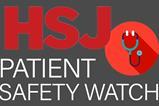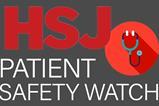HSJ hosts the Patient Safety Watch newsletter, written by Patient Safety Watch chief executive James Titcombe.
Good afternoon and welcome to the latest edition of the Patient Safety Watch newsletter.
Latest MBRRACE-UK report highlights urgent need to improve care for mothers
The latest MBRRACE-UK report – Saving Lives, Improving Mothers’ Care – published this week, has revealed a concerning increase in maternal mortality. Between 2020 and 2022, 275 women died during or shortly after pregnancy, a rate of 13.56 deaths per 100,000 maternities – a statistically significant rise compared to previous years, even after excluding covid-related deaths.
The report also highlights continuing inequalities, with Black women facing three times the risk of death compared to white women, and women from deprived areas and those aged over 35 also experiencing significantly higher mortality rates.
Nearly eight out of 10 women who died could have received better care, and for nearly half the women who died this may have made a difference to the outcome.
Judy Ledger, chief executive of the charity Baby Lifeline, described the report as “distressing”, adding: “We hope it will be a wake-up call to decision-makers that more needs to be done to improve care for mothers before, during, and after pregnancy.”
My view? The latest MBRRACE report provides further evidence that maternity safety in the UK is moving in the wrong direction. The rise in deaths, particularly among vulnerable groups, is deeply concerning. The findings underscore the growing complexity of maternity care and in my view, the need for a new national strategy to support maternity services to make and sustain the changes that are so clearly needed.
Government announces pilot to reduce brain injury in childbirth
The Department of Health and Social Care has announced that NHS maternity staff will participate in a training programme to reduce avoidable brain injuries in childbirth.
The Avoiding Brain Injury in Childbirth pilot launched this week, starting with nine maternity units, with the goal of rolling out the programme nationally next year. Among the training’s aims are helping staff better identify babies who are showing signs of distress during labour and better deal with emergencies which happen when a baby’s head becomes lodged in the mother’s pelvis during a caesarean.
Baroness Gillian Merron, minister for patient safety, women’s health and mental health, said: “This is a critical step towards avoiding preventable brain injuries in babies, as we work to make sure all women and babies receive safe, personalised and compassionate care.”
New chief named for watchdog
Former trust CEO Sir Julian Hartley has been revealed as the Care Quality Commission’s next chief executive.
Sir Julian, currently chief executive of NHS Providers, will take over from Kate Terroni, the CQC’s deputy chief, who has been acting as the regulator’s interim CEO since Ian Trenholm’s sudden departure this summer.
Sir Julian said: “It is vitally important for NHS trusts, foundation trusts and the wider health and care sector to have effective regulation to support improvement and safe care for patients. This move will give me an opportunity to really focus on that goal.”
His appointment comes shortly after the publication of a heavily critical interim review into the watchdog’s performance by North West London Integrated Care Board chair Penny Dash.
NHSE director issues warning about beds ahead of winter
At NHS England’s board meeting earlier this month, national director of urgent and emergency care Sarah-Jane Marsh warned the service would be unable to create extra capacity to the same level it had done to get through previous winters, adding she was “very concerned” about the service’s resilience this year.
Ms Marsh told the board meeting: “We don’t have that ability to surge our beds much higher than they already are. We don’t have additional money to support social care discharge that we’ve had in previous years. We’re doing everything we can to prepare but I think it will be challenging in particular places at particular times.”
New toolkit launched for repeat prescriptions
The Royal Pharmaceutical Society and Royal College of GPs have published a new toolkit for repeat prescribing, which is aimed at improving the “consistency, safety and efficiency” of repeat prescribing systems.
The NHSE-commissioned toolkit is the first set of national good practice guidance on repeat prescribing in 20 years.
Michael Mulholland, RCGP honorary secretary, said: “Safe and appropriate prescribing is a key skill for GPs, and something we take very seriously, taking into account the unique circumstances of every patient, in conversation with them. Repeat prescribing makes up a large part of general practice workload and we need to make sure we are always streamlining and improving the process.”
Staff ‘rebuked’ for raising safety concerns about cancer treatment
HSJ has reported staff were “rebuked” for raising safety concerns about cancer treatment at East and North Hertfordshire Trust – where an external review has identified how incorrect chemotherapy use may have contributed to four patient deaths in 2019 and 2020.
The external review also found a “reluctance of staff to escalate safety concerns”, adding: “Some members of the [multidisciplinary team] did not feel empowered to escalate issues around [systemic anticancer therapy] assessments, with some staff stating that they felt that they were rebuked for escalating out-of-range blood test results.”
ENHT medical director Justin Daniels said: “We sincerely apologise for what went wrong for four patients who were harmed and their loved ones. We are learning from this as we do from all incidents.”
Sharing some good stuff…
PSIRF in Practice course wins HSJ poster prize
A course developed by Annie Hunningher and colleagues at Barts Health won the people’s vote to win the HSJ Patient Safety Congress poster prize last month. The training session runs for half a day and aims to demystify PSIRF and make it meaningful. Some course content, such as SWARM huddle role-plays, after action reviews and local governance detail, is co-created with teams to ensure it is relatable to different specialty areas.
Dr Hunningher told me: “I know that patients have joined the course and have really enjoyed being part of the teams.”
The poster can be seen here and gives more detail – fantastic work that I’m sure other trusts will look to learn from.
Can you help improve escalation of suspected fetal deterioration?
A team from The Healthcare Improvement Studies Institute at the University of Cambridge is “seeking to develop ways of supporting maternity professionals when fetal deterioration during labour is suspected and escalation is needed”. As part of this, the team is looking for feedback from maternity professionals on a draft version of a model intended to show how escalation should happen.
More information and how to get involved is available here.
Baby Lifeline launches Maternity Unit Marvels Awards 2025
Baby Lifeline has launched the UK MUM Awards 2025, celebrating stories of exceptional maternity and neonatal care.
If your maternity or neonatal team has done something extraordinary, why not consider nominating them?
Website launched to share learning from inquests and inquiries
Inquests and Inquiries is a new website designed to share learning from inquests and inquiries. Its creator, Steve Johnson, works in academia and the military on risk and safety and was keen to find a way to check decisions against previous findings and lessons from disasters and accidents. What shocked him was not only was there no central repository, but some materials were no longer available from inquiries and some material was lost in archives.
Mr Johnson told me: “It’s very much a work in progress… the central concept is a master spreadsheet of all recommendations and there is a page for each major theme of ‘issue’, eg health, with a spreadsheet and links to allow a user to bulk download or explore all the materials in that area.”
Mr Johnson is keen for feedback and welcomes requests either for analysis or gathering data or offers of help in extracting material. Fantastic and important work!
HSJ Patient Safety Congress sessions available for those who missed it
Last month, more than 1,000 attendees across UK healthcare attended the HSJ Patient Safety Congress in Manchester Central. On-demand recordings from the Congress are now available on the event app for attendees to access.
However, if you were unable to attend in person, you don’t have to miss out! All 37 hours of educational content are now available via on-demand passes for non-attendees to watch anytime. Please contact James.Elliott@hsj.co.uk or on 020 7549 8648 for more information and to purchase.
That’s all for this edition, but before signing off, a quick note about Baby Loss Awareness Week, which runs from 9 to 15 October.
This week is an important time to reflect, raise awareness, and offer support to all those affected by pregnancy and baby loss as well as being an opportunity for families to come together, share their experiences, and honour the babies they have lost.
The week culminates with the global Wave of Light at 7pm on 15 October, where people can light a candle in memory of all babies’ lives gone too soon and pictures can be shared with the hashtag #waveoflight.
For anyone affected by baby loss, whether directly or indirectly, this is a time to be gentle with yourself. Grief can be an isolating experience, but Baby Loss Awareness Week reminds us that we are not alone. It’s important to reach out for support when needed – organisations like Sands offer invaluable information and links.
That brings this edition to a close. Please look out for our next newsletter in two weeks. Until then, thanks for reading and stay safe.
James Titcombe































No comments yet